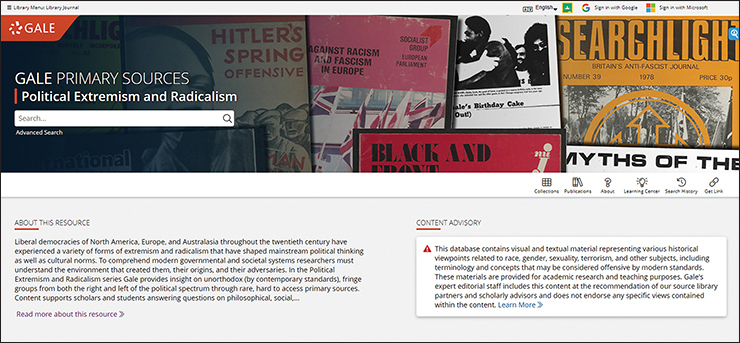Political Extremism & Radicalism Part III: Global Communist and Socialist Movements | eReview
With its sophisticated search capabilities, support for primary-source literacy, and singular collections of primary-source material, this resource is a must-have for libraries supporting historical and political research of far-left political movements.
Gale: Political Extremism & Radicalism Part III: Global Communist and Socialist Movements
CONTENT Global Communist and Social Movements, the third module in Gale’s award-winning series on political extremism and radicalism, provides a window into the thoughts and experiences of communist, socialist, and left-wing thinkers and political groups. The archive features primary-source materials and firsthand narratives from 1800 to 2012, focusing on documents from the early 20th century (1880–1960). While the first two modules in the archive (Far-Right and Left Political Groups in the U.S., Europe, and Australia in the Twentieth Century; Far-Right Groups in America) have a narrower focus, this third installment explores a broad range of documents drawn from countries worldwide.
Over 870,000 pages of materials, including letters, books, periodicals, papers, pamphlets, and ephemera, chronicle the people and actions of communist and socialist groups operating within capitalist countries. These documents address political ideologies such as Stalinism, Trotskyism, Maoism, Marxism-Leninism, and anarchism. The coverage should appeal to researchers in disciplines like political science and communist, socialist, or far-left history.
Content is drawn from the British Library; the Federal Bureau of Investigation; the U.S. Senate House Library; the University of California, Davis; the University of London; Yale University; Harvard Law School Library; and New York University. Notable collections include papers from anti-socialist organizations in Britain and the FBI American Legion Contact Program, archives of the Independent Labour Party, and Yale University’s Rose Pastor Stokes Papers.
USABILITY The homepage features a basic-search bar with options for advanced searching. Users might appreciate the prominent content advisory, as the database features historical material related to race, gender, sexuality, and terrorism. The homepage also provides access to Gale’s Learning Center, a resource designed to help researchers increase primary-source literacy, craft more effective searches, and better understand the composition of the archived resources.
Gale continues to provide basic and advanced searching with facets familiar to researchers, but now also offers more high-quality search features that should appeal to various research styles and needs. For instance, students and beginning researchers may find Gale’s term-frequency and topic-finder tools useful. The term-frequency tool presents single or multiple time lines in an interactive graph, allowing users to compare coverage of various events, countries, or people. The topic finder presents results in a tile or wheel format, with dominant results appearing larger. Clicking on any section within the topic visualization provides ready access to linked resources, all of which are presented in Gale’s intuitive, multi-functional text reader.
PRICING Part III is available for a one-time purchase or subscription by academic and public libraries, with actual costs determined by institutional full-time enrollment or population served. All one-time purchases include a minimal annual hosting fee. Bundle discounts are available when making multicollection purchases.
VERDICT Global Communist and Social Movements complements the first two modules in Gale’s series, but it can certainly stand alone. With its sophisticated search capabilities, support for primary-source literacy, and singular collections of primary-source material, this resource is a must-have for libraries supporting historical and political research of far-left political movements.
RELATED
ALREADY A SUBSCRIBER? LOG IN
We are currently offering this content for free. Sign up now to activate your personal profile, where you can save articles for future viewing










Add Comment :-
Comment Policy:
Comment should not be empty !!!